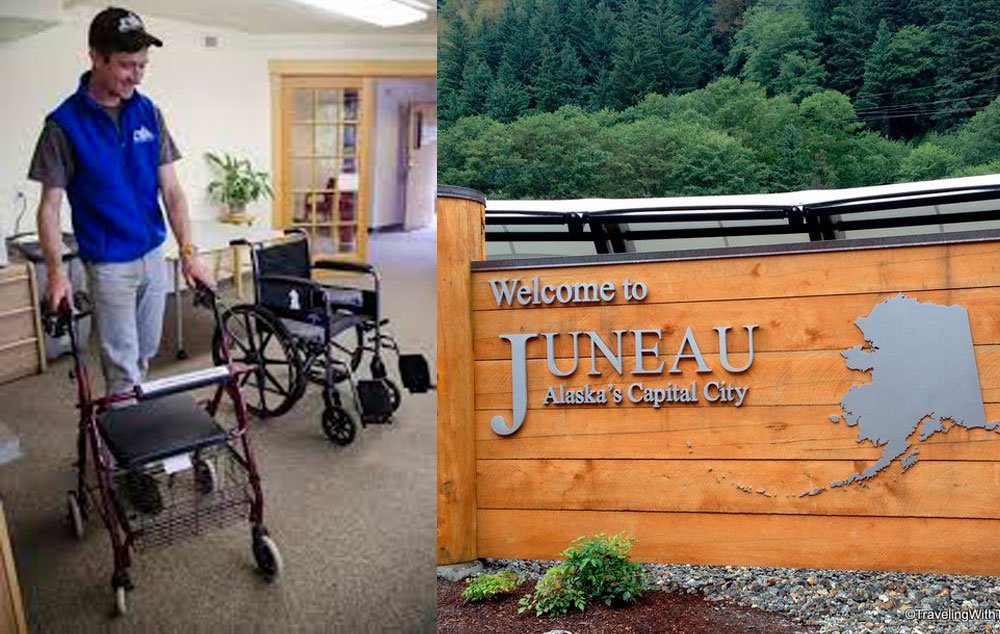What makes an Alaska vacation great? The ability to experience it to one’s fullest potential. For some, that means using adaptive technology for mobility, sight, hearing or finding an accessible tour — and SAIL has got it covered.
Southeast Alaska Independent Living accessible tourism specialist Kevin Crowley is overseeing all aspects of accessible tourism in Juneau, from providing businesses with information and training to physical equipment to improve the experiences of visitors with disabilities.
In its first year, the program received seed support from the Rasmuson Foundation and an allocation from the City and Borough of Juneau Marine Passenger Fee Program. The funding was used to develop training programs for businesses regarding access and customer service for visitors with disabilities.
The training was developed for local tourism and retail businesses and is tailored to the industry, from hospitality to guiding and everything in between.
Consultations for accessibility are also available.
Businesses taking advantage of SAIL’s accessible tourism services may find it to be a win-win situation — the training and half-hour consultation are currently free, and accessibility is good for business, Crowley said.
“The need for this type of customer service training is really important,” he said. “To have that stamp of know-how will be really important for serving a larger percentage of the total population.”
Especially with the “silver tsunami” looming, catering to the different abilities of the elderly, as well as people with disabilities of all ages, makes good business sense, Crowley explained.
“It will lead to, for lack of a better term, more foot traffic,” Crowley said. “And increased revenues for businesses.”
The training has been approved by the Tourism Management Best Practices Group. It’s also encouraged by the Juneau Convention and Visitors Bureau, whose staff and volunteers have undergone training themselves.
Crowley described the training as a way to “bridge the gap” for businesses that are not specifically accessible, allowing them to provide adaptive assistance and meet visitors halfway “to be able to provide a positive experience.”
The consultations SAIL is offering would address accessibility, not just at an architectural level. Half-hour consultations can provide businesses with suggestions for how to present information or helpful adaptive technologies, from audio-enhancing devices for the hearing impaired to alarms with both strobe lights and loud noises.
While businesses move forward with training and adaptive measures to meet the needs of visitors with disabilities, SAIL is also offering services directly to visitors to bridge those gaps.
Crowley mans an accessibility hotline, available to provide information on accessible services and tours, and to provide visitors with loaner adaptive equipment.
Visitors with disabilities can connect with SAIL to borrow equipment from wheelchairs and walkers to pocket talker audio devices and magnifiers for the visually impaired. Visitors provide credit card information in case of damage or loss, but this service is also free.
“Frequency of calls is increasing with more outreach,” Crowley said.
He’s been working with the JCVB, as well as reaching out to cruise lines and shore excursion managers.
“So far it’s been within our realm of knowledge. If not, its usually within pretty close reach,” Crowley said.
SAIL is working on accessibility survey to better determine the needs they can meet. The organization is also looking at the sustainability of the program offering free services and the potential of expanding beyond Juneau to include other Southeast Alaska communities or possibly going statewide.
Crowley acknowledged that, in the peak of the tourism season, it may be hard for businesses to commit time to trainings and consultations, but recommended that local businesses make the time.
The more people access and are aware of this program, Crowley said, the “less people are going to fall between the cracks.”
Source: Juneau Empire



